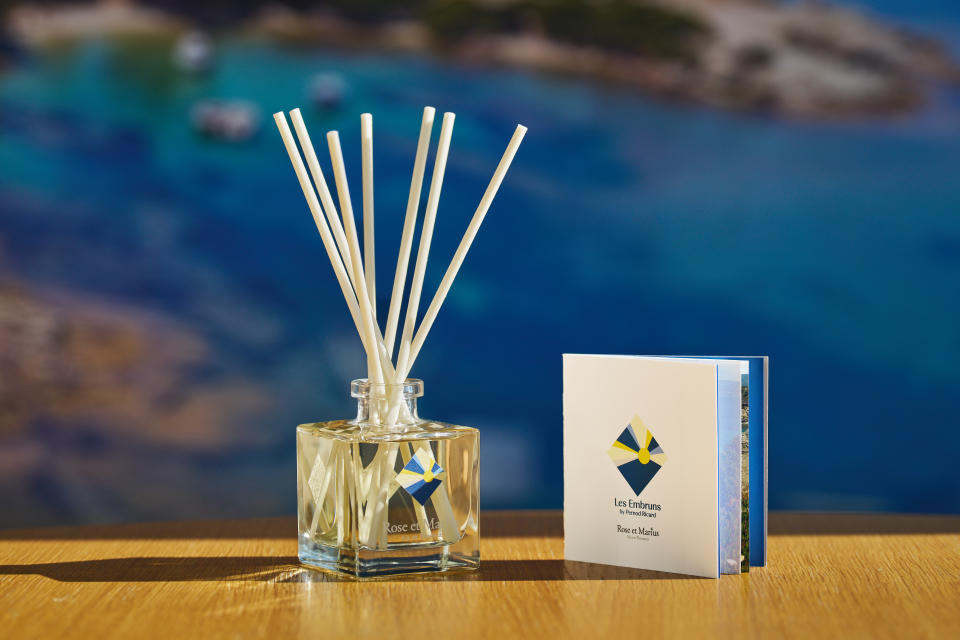EXCLUSIVE: For Corporate Branding, Pernod Ricard Follows Its Nose

PARIS – Corporate branding is taking on a whole new dimension at Pernod Ricard. The French wine and spirits giant has created its own scent that will waft around the lobbies of its offices worldwide, so its 18,300 employees and visitors can have a common olfactory experience.
Ambient scents, forging a brand’s olfactive identity, are more typically found these days in hotels and retailers.
More from WWD
Beautifying the Home: 9 New Household and Cleaning Launches From Diptyque, Snif and More
Passion Becomes Profession for Agatha Relota Luczo, Olive Oil Sommelier
Called Les Embruns, which translates into Sea Spray, Pernod Ricard’s scent was concocted with Magali Fleurquin-Bonnard. She founded Rose et Marius, a company based in Aix-en-Provence, France, that produces fragrances and perfumed objects by hand.
“The idea was to offer something very unique, to associate a large group like Pernod Ricard with a smell,” said Fleurquin-Bonnard. “It’s true that smell says a lot about us – our values, what we want to transmit.”
She worked closely with Pernod Ricard executives on Les Embruns, which started with the idea of the island of Embriez, located in the south of France and which has belonged to the group since 1958. Eight hundred top managers convene there annually to work, and “to celebrate our reason for being, which is to create conviviality,” explained Emilie Martin, The Island internal communication project manager at Pernod Ricard.
Embriez and Bandol, another island nearby also purchased by group founder Paul Ricard in the 1950s, are so embedded in the fabric of the company that its Parisian headquarters, opened in 2020, was dubbed The Island.

The aim with Les Embruns, explained Martin, “is to create an olfactory entity at The Island, so the collaborators have this common olfactory link when they arrive here and in all the group’s subsidiaries.”
To develop the fragrance, a windy day on Embiez, with all the natural odors and sea spray wafting about, was envisioned. “We started to write a story with a lot of notes,” said Fleurquin-Bonnard.
Those included notes of the green fig tree, thyme, fennel and other aromatic plants growing on the Mediterranean coast. Some ingredients make direct links to Pernod Ricard’s iconic drinks, such as absinthe.
“It smells green and is fresh, and therefore completely served this project [well],” said Fleurquin-Bonnard, adding such notes nod to the collective imagination that pours into spirits making.
Once the scent’s creative structure was underway, 80 Pernod Ricard employees were invited to attend a workshop involving raw olfactive ingredients.
“Based on their feedback, we adapted the perfume, so it was really a co-creation, too,” said Fleurquin-Bonnard, who described the process as sustainable development, which is key at both Rose et Marius and Pernod Ricard.
Not only should the scent smell good, she said, but “it goes well beyond that and can transmit values that are strong.”
Les Embruns is alcohol-free, made with a mix of natural oils, making a 20 percent perfume concentration that is diffused through compressed felt sticks. There is also an associated candle in Limoges porcelain.
The fragrance will be deployed in the entryways of Pernod Ricard’s 75 subsidiaries around the globe.
“Culture must bring us together and resemble us,” said Charlotte Judet, executive vice president global communications at Pernod Ricard. “This olfactory identity is part of the codes that will allow us to identify with the corporate culture, which is extremely strong.”
Best of WWD

 Yahoo Finance
Yahoo Finance 